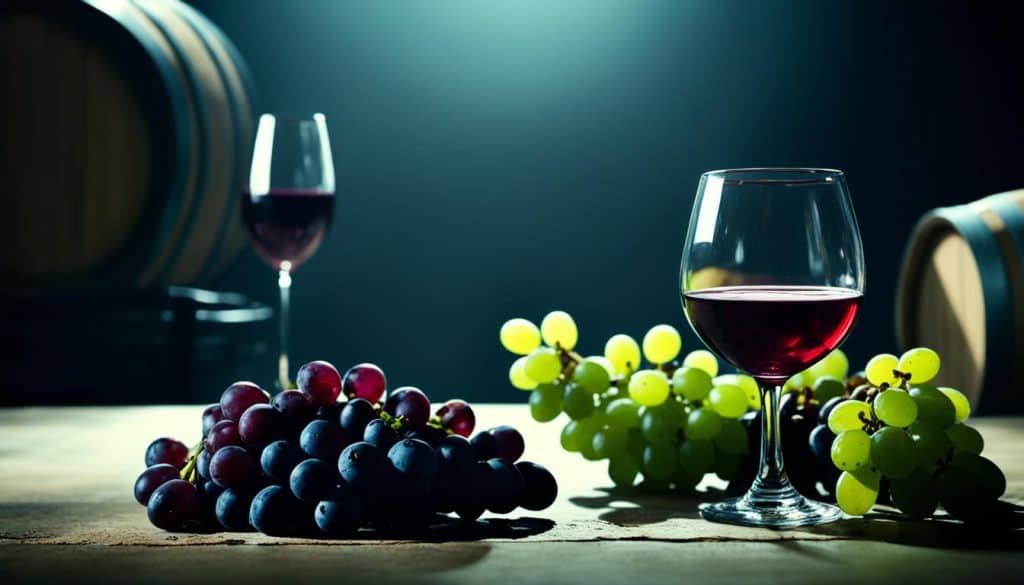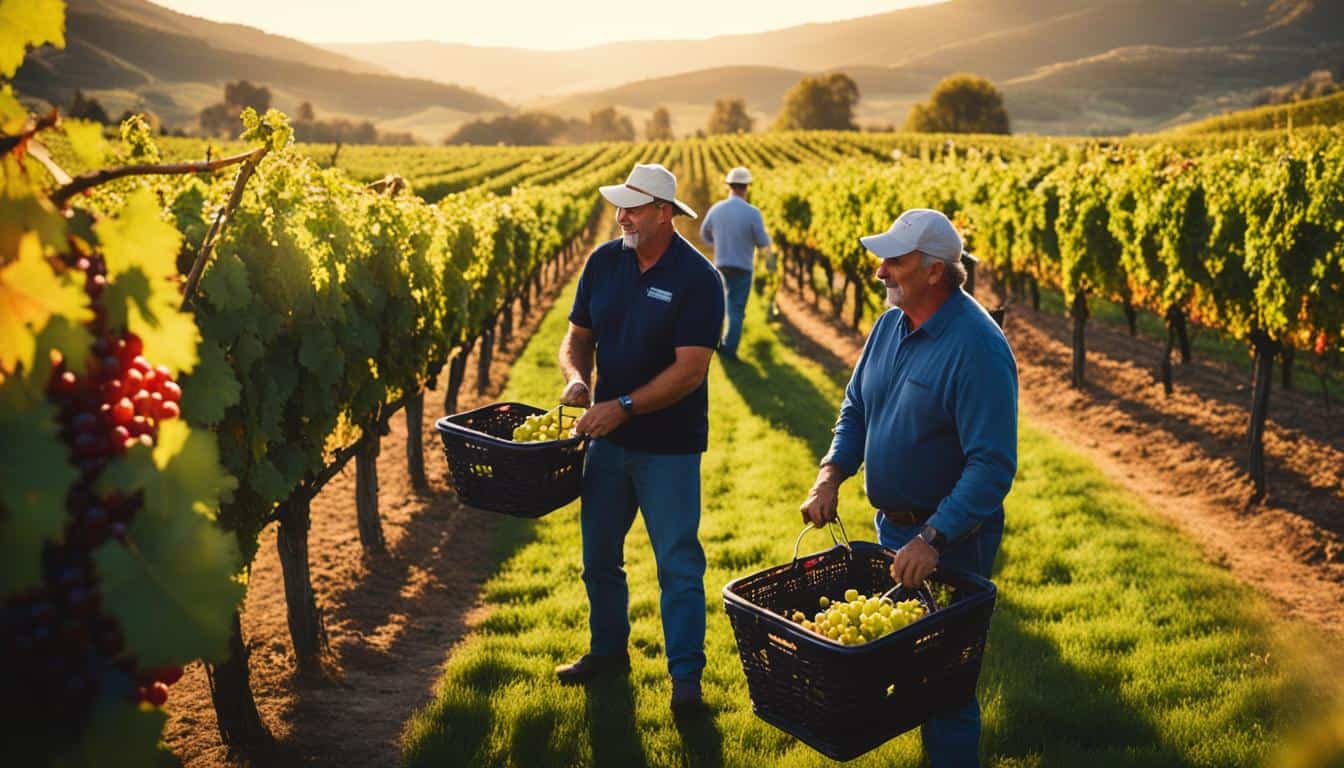Table of Contents
Ever wondered how wine making began in ancient times? How did it find its way into the Bible’s stories? Join us as we dig into five intriguing tales. These stories show the important part vintners played in ancient times. We’ll look at Noah’s vineyard and Jesus’ miracle at the Wedding at Cana to learn about wine’s rich history.
Noah, the First Vintner
After leaving the ark, Noah immediately plants a vineyard. He then makes history as the first person to turn grapes into wine. This story, found in Genesis 9:20-21, shows the start of a tradition. It shows that growing crops and making wine were very important for early societies.
“And Noah began to be an husbandman, and he planted a vineyard: And he drank of the wine, and was drunken; and he was uncovered within his tent.”
Noah is most famous for the ark he built. But, his work with vines gives us a peek into ancient wine production. He saw the value of farming right after the flood and started a vineyard. This action laid the groundwork for wine crafting through the ages.
The Bible, in Genesis 9:20-21, tells how Noah’s first taste of wine left him drunk. His experience warns about the impact alcohol can have. It reminds us to drink in moderation and to be careful with such a potent drink.
Moreover, Noah’s story as the very first maker of wine links farming to wine production. Both were key for early groups, offering food, items for trade, and cultural practices.
The Importance of Agriculture and Winemaking in Early Civilizations
“For you are vintners, agriculturists, who have cultivated the land and turned grapes into wine, creating a foundation for the development of early civilizations.” – Ancient Wisdom
Agriculture, like growing grapes, was vital for early settlements. Producing wine played a big role. It let them save their harvest and added joy to their cultural events through a special drink.
| Significance of Noah as the First Vintner | Impact on Early Civilizations |
|---|---|
| –Genesis 9:20-21 shows Noah’s start in winemaking, connecting him with its origins. | -Farming and wine created food, culture, and chances for trading in old societies. |
| -Noah’s vineyard represents how important farming is. It shows the drive for more and better crops. | -By making wine, ancient people could celebrate and worship in more meaningful ways. |
Noah’s early efforts in winemaking weren’t just for fun. They provided for his family. More importantly, he started a tradition. One where wine has always been linked to human life and culture.
Lot’s Drunken Mistake
In Genesis 19:30-35, the story doesn’t make vintners look good. After Lot escaped from Sodom and Gomorrah, he and his daughters lived in a cave. Lot drank some wine his daughters made and got really drunk. This led to a terrible mistake where he had children with his own daughters.
This story is a strong warning about the dangers of too much alcohol. It shows how important it is to drink responsibly and know your limits. Lot’s mistake happened because he didn’t use caution when drinking.
“And both the daughters of Lot were with child by their father.”
The narrative about Lot reminds us that making and enjoying wine should be done carefully. Even though their story is dark, it emphasizes the need for winemakers and drinkers to act responsibly. Vintners have a duty to ensure their products are appreciated in moderation.
References:
- Genesis 19:30-35 – Read Here

The Spies Sent to Canaan
In Numbers 13:23, twelve spies explore the promised land and find large grapes. This event shows Canaan as a place where growing grapes was very important.
Moses asked these spies to look closely at Canaan. They went in secretly to check everything. In their journey, they found a place with so many big grapes. This amazed them because of how rich and abundant it was.
“We saw grapes as big as the promised land itself…” one of the spies recounted excitedly.
This find proved Canaan was really fertile. The huge grape clusters meant the land was full of goodness. It showed the Israelites what they could expect in this new land.
The story made Canaan look very desirable, especially with its grapevines. It made the Israelites even more eager to go there. This was a land where good things grew and people could live well.
In the image above, you can see the amazing grapes the spies saw in Canaan. These grapes gave the Israelites hope and made them excited to go to their new home. It was a sign of the great things that awaited them.
| Key Takeaways from the Story: |
|---|
| The spies sent to Canaan discovered an impressive cluster of grapes |
| The grapes were so large that they needed to be carried on a pole |
| This discovery symbolized the fertility and abundance of the promised land |
| It highlighted the significance of viticulture in Canaan |
The spies’ trip to Canaan talks about how important grapes were back then. They not only found out how good the land was but also learned how deeply Canaan’s culture valued grape growing and making wine. Their find motivates the Israelites to go claim Canaan, a place full of fertile soil and lots of grapevines.
The Wedding at Cana
One of Jesus’ first miracles was at a wedding in Cana, turning water into wine. It shows his amazing power and the symbolic place of wine in celebrations.
“And the third day there was a marriage in Cana of Galilee; and the mother of Jesus was there: And both Jesus was called, and his disciples, to the marriage.” (John 2:1-2)
Jesus being invited to the wedding in Cana shows how important celebrations were back then. They were big, joyful events that lasted days. Wine was the key part, symbolizing plenty, joy, and good fortune.
The supplies ran low on wine, bringing trouble. Mary told Jesus, and he turned water into the best wine, showing his divine care for people’s needs.
Changing water into wine is more than a magic trick. It’s about Jesus bringing us full and joyful lives. It means he’s ready to help and give more, turning simple things into something special.
The Importance of Wine in the Bible
In the Bible, wine often stands for happiness, growth, and the good things in life. It’s part of ceremonies, feasts, and shows cultural importance since ancient times.
Wine’s special use goes beyond culture. In the New Testament, Jesus calls himself the “True Vine.” This shows that like wine from grapes, Jesus changes our lives for the better.
| Symbolic Meanings of Wine in the Bible | Biblical References |
|---|---|
| Celebration and Joy | Psalms 104:15; Ecclesiastes 9:7; Isaiah 25:6 |
| Abundance and Blessings | Proverbs 3:9-10; Hosea 2:21-22 |
| Metaphorical Representation of Jesus | John 15:1-5 |
As we think about the Wedding at Cana, we see Jesus can change things for the better. Just like turning water into wine, his touch can make life richer and more joyful. This reminds us to see and celebrate his miracles in our lives, and feel his abundant love.

The Parable of the Tenants
In Matthew 21:33-41, Jesus shares a story called the Parable of the Tenants. It’s about a landowner who rents his vineyard to some farmers. The vineyard is a sign of God’s kindness, and the farmers are asked to look after it well.
Mistreatment starts when the farmers ignore their duties. They hurt and kill the servants the landowner sends to get the harvest. This shows how the farmers turned their backs on the landowner.
In the story, the vineyard is like our world, the landowner is God, and the farmers are the religious leaders back then. Jesus is warning us of what happens when we ignore God’s messages and mismanage His gifts.
This story teaches us a lot. It shows how important it is to take good care of what God gives us. It also makes us think about how we treat other people.
“Therefore, when the owner of the vineyard comes, what will he do to those tenants?” – Matthew 21:40
Just like the farmers faced a tough punishment for their bad actions, we also need to be cautious. We should manage God’s gifts wisely and treat everyone well.

Key Takeaways
- The Parable of the Tenants, found in Matthew 21:33-41, shows what happens when we mistreat God’s gifts.
- The vineyard represents the world, the landowner is God, and the farmers are the religious leaders then.
- This story tells us to be good caretakers of what God gives us. We should love, respect, and treat others fairly.
| Key Points | Details |
|---|---|
| Parable of the Tenants | Matthew 21:33-41 |
| Landowner | Symbolizes God |
| Vineyard | Represents the world |
| Tenants | Symbolize the religious leaders of the time |
| Mistreatment | Highlights the consequences of ingratitude and betrayal |
Conclusion
We have explored the interesting stories of wine making in the Bible. Noah was the first to start winemaking. We also learn from Lot’s mistake about the dangers of drinking too much.
The stories about spies going to Canaan and the wedding at Cana show how special wine is in the promised land and at joyful events. These tales teach us about the bond between vintners and Biblical wine making traditions.
The Bible stories about wine reflect its importance in ancient times. They talk about the land of Canaan’s rich vineyards and Jesus turning water into wine. Wine is seen as a symbol of happiness and is important in different traditions through the years.




